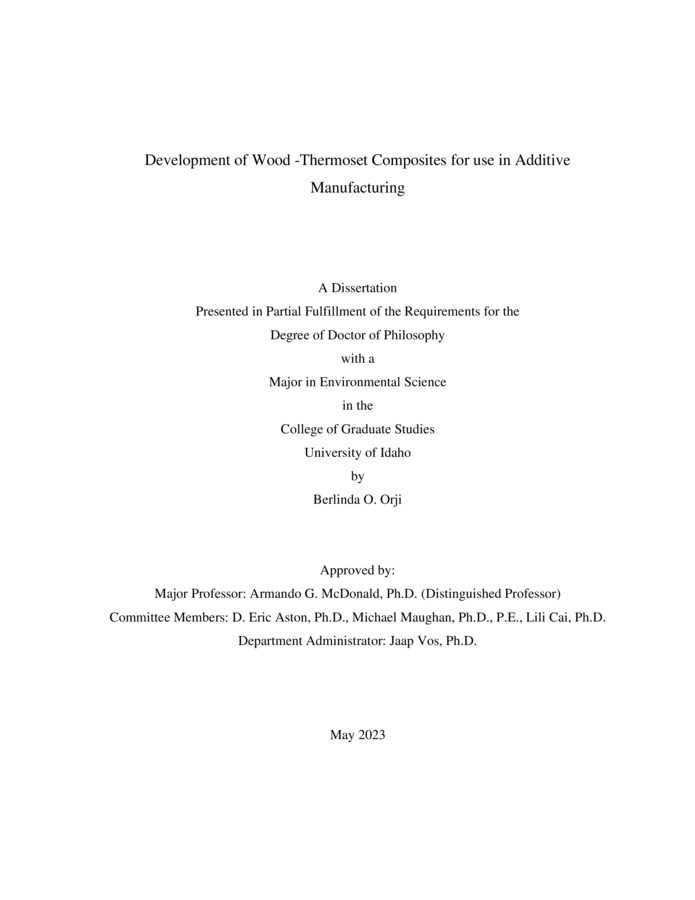Development of Wood -Thermoset Composites for use in Additive Manufacturing
Orji, Berlinda Oluebube. (2023-05). Development of Wood -Thermoset Composites for use in Additive Manufacturing. Theses and Dissertations Collection, University of Idaho Library Digital Collections. https://www.lib.uidaho.edu/digital/etd/items/orji_idaho_0089e_12546.html
- Title:
- Development of Wood -Thermoset Composites for use in Additive Manufacturing
- Author:
- Orji, Berlinda Oluebube
- ORCID:
- https://orcid.org/0000-0002-3693-5591
- Date:
- 2023-05
- Program:
- Environmental Science
- Subject Category:
- Environmental science; Polymer chemistry
- Abstract:
-
AbstractThis dissertation presents four different projects that aim at developing wood-thermoset composite systems that can be used for additive manufacturing (AM) purposes. AM is a promising technology that can aid in the utilization of sawmill residues with the direct fabrication of complex structures. With this goal in mind, the use of two traditional thermoset resins (phenol resorcinol formaldehyde (PRF) and melamine-modified urea formaldehyde (UF)) and a geo-based adhesive (sodium silicate (SS)) in composite fabrication were explored. Natural fibers of wood (40 and 200 mesh) and denim fibers were considered in high loadings from 50 to 90 wt.%. Material based extrusion technique of AM was used for this study. Curing studies and kinetics of the various resins and blends were explored using modulated differential scanning calorimetry (DSC) and activation energy was determined between 51 kJ/mol and 271 kJ/mol for PRF and wood blends, 100 kJ/mol and 367 kJ/mol for UF and wood blends; and 85 kJ/mol and 125 kJ/mol for SS and wood blends, respectively. The use of CO2 as an alternative curing mechanism for SS and wood blends was explored at different reaction times, pressure and curing temperatures to aid in the reduction of thermal energy input in the production of composites and promote carbon sequestration. CO2 uptake increased with exposure time and pressure. Wood 200 mesh fiber-SS composites showed better mechanical and thermal stability properties in comparison to wood 40 mesh-SS composites. The use of three modifiers (eggshells, corn starch and sulfonated castor oil (SCO)) were also studied to improve the processability and properties of the composite’s blends. Fabricated composites all showed good shear thinning behavior which is an important factor in AM. Thermal stability analysis of composites which was determined using thermogravimetric analysis (TGA) was improved with the addition of wood fibers. Conclusively, Composites made with 50% wood fibers were successfully extruded with the PRF and SS resins but was not for the UF resin composites.
- Description:
- doctoral, Ph.D., Environmental Science -- University of Idaho - College of Graduate Studies, 2023-05
- Major Professor:
- McDonald, Armando G.
- Committee:
- Aston, D. Eric; Maughan, Michael; Cai, Lili; Vos, Jaap
- Defense Date:
- 2023-05
- Identifier:
- Orji_idaho_0089E_12546
- Type:
- Text
- Format Original:
- Format:
- application/pdf
- Rights:
- In Copyright - Educational Use Permitted. For more information, please contact University of Idaho Library Special Collections and Archives Department at libspec@uidaho.edu.
- Standardized Rights:
- http://rightsstatements.org/vocab/InC-EDU/1.0/

